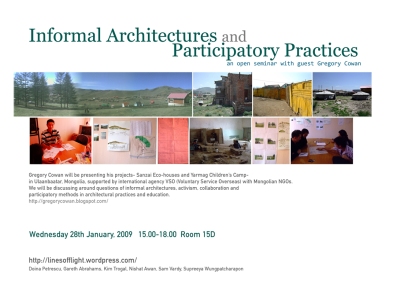I read a UN report today about Mongolia's progress towards its Millenium Development Goals for 2015. The 22 targets are grouped 1) almost achieved, 2) progressing, 3) slow, and 4 ) regressing. In group 3, 'slow', a few stood out to me. Poverty levels, gender ratios in higher education, and access to adequate sanitation facilities I found most relevant. In group 4, 'regressing', poor literacy of youths aged 15-24 seems most immediate and challenging.
I began to draft a mid-term report;
My role as 'architect teacher trainer' in the small peri-urban construction college in
There are very few resources for architectural education available in the Mongolian language, while literacy problems and poor teaching facilities also provide barriers to teaching. The Russian materials and methods previously commonly used are often outdated, and English and German language materials (Chinese language materials seem to be culturally taboo) are often even more inaccessible, both financially and linguistically. The architectural community of a country which has been in transition from communism since 1992 is also disconnected from world standards and communication. The elusive Arkitektorjdiin Kholboo (Mongolian Association of Architects) is “dormant”.
Yet some of the VSO skill-sharing work I have undertaken has developed the confidence and literacy of architecture teaching staff. Since I have been training, two teachers have moved on to better-paid jobs. A curriculum is rarely consciously employed; although it remains on file “at the Ministry”, teachers apparently measure student progress largely by perseverance. Soon, the first cohort of diploma students will complete their fourth year. Those of the latter I have spoken to do not seem to have been remotely aware of 'the' Mongolian architecture textbook (Bat-Od, 2005, 2007), let alone basic texts used internationally, like FDK Ching’s ‘Form, Space and Order’, the US Architectural Graphic Standards, or Neufert’s ‘Architects’ Data’ (in 18 languages). Building and planning codes may exist, but are almost unknown, and seem to be poorly controlled. Physical accessibility to buildings and streets for people without disabilities is difficult enough, but independent living for people with disabilities is almost unheard-of.
On the other hand, much potential exists for future development in the secondary and tertiary Ger districts, (informal settlements), as well as in the much anticipated new social housing, and in commercial development, so often 'outsourced'. Still, there is life beyond work, and many people seem to enjoy more time with their families and better access to locally grown food than in the








